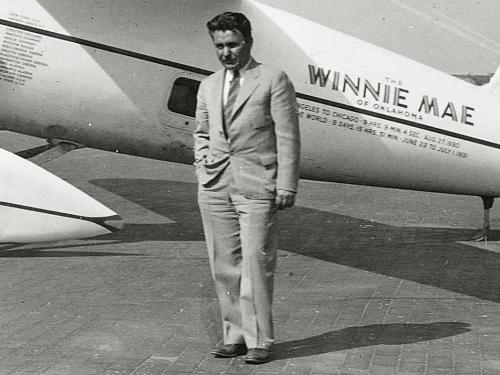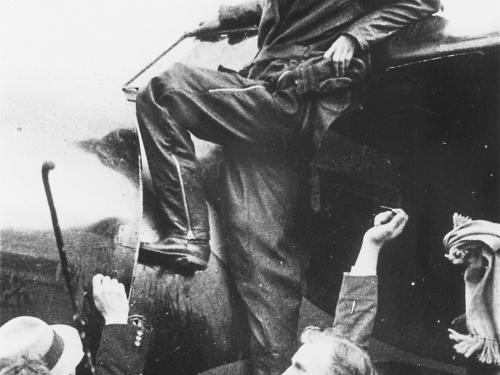
Stories of daring, stories of technological feats, stories of prevailing against the odds ... these are the stories we tell at the National Air and Space Museum. Dive in to the stories below to discover, learn, and be inspired.
Showing 101 - 110 of 111

April 19, 2011
Things such as the Hope Diamond, the Star Spangled Banner, the Lansdowne portrait of George Washington, and Charles Lindbergh’s Spirit of St. Louis airplane are good examples—one-of-a-kind items, familiar to all, and widely known to reside at the Smithsonian. Also in this subset of signature objects is one of the most significant in the entire Smithsonian collection—the Wright Flyer, the world’s first airplane.

March 18, 2011
On March 18, 2011, at 8:45 pm EDT, MESSENGER became the first spacecraft ever to enter Mercury's orbit. In this blog, Tom Watters reflects on the importance of this achievement.

January 18, 2011
In 1909, military aviation began with the purchase of the Wright Military Flyer by the U.S. Army. The Navy sprouted wings two years later in 1911 with a number of significant firsts.

October 14, 2010
On October 14, 1947, Charles E. “Chuck” Yeager became the first person to fly faster than the speed of sound in his Bell X-1, which he named Glamorous Glennis, in tribute to his wife. He reached a speed of 1,127 kilometers (700 miles) per hour, or Mach 1.06, at an altitude of 13,000 meters (43,000 feet).

October 12, 2010
Eugene Jacques Bullard is considered to be the first African-American military pilot to fly in combat, and the only African-American pilot in World War I.

September 12, 2010
Have you ever had a dream of what you wanted to do in life? How about a wish that you hoped every day would come true? Were you ever truly inspired by something or someone at an early age that shaped the course of your life? Living a lifelong dream does not come to many, but for Dr. Mae Jemison, space travel was always an area of fascination.

August 07, 2010
On August 7, 1980, Janice Brown flew the Penguin almost 3.5 km (two miles) that day in 14 minutes, 21 seconds. This was the first sustained flight of a solar-powered aircraft and the longest Penguin flight since development had started on the aircraft two years earlier.

July 22, 2010
July 22, 2010, marks the 77th anniversary of Wiley Post’s 1933 solo flight around the world in the Lockheed 5C Vega Winnie Mae. This record-breaking flight demonstrated several significant aviation technologies. It used two relatively new aeronautical devices—an autopilot and a radio direction finder.

May 20, 2010
On May 20, 1932, that Amelia Earhart set out in her Lockheed 5B Vega to become the first woman to fly nonstop and alone over the Atlantic Ocean. Departing from Harbour Grace, Newfoundland and landing in Londonderry, Northern Ireland about 15 hours later, she also became only the second person to solo the Atlantic, the first being Charles Lindbergh in 1927. It was also her second trip across the Atlantic. Earhart first came to the public’s attention four years earlier, in June 1928, when she made headlines for doing nothing more than riding as a passenger--but she was the first female to do so. And although it didn’t matter to the public that she never touched the controls of the aircraft during the transatlantic flight from Newfoundland to Wales, it mattered to Earhart.

April 12, 2010
Every year as the anniversary of the first human spaceflight approaches, I receive calls inquiring about the validity of Yuri Gagarin’s claim as the first human in space. The legitimate questions focus on the fact that Gagarin did not land inside his spacecraft.